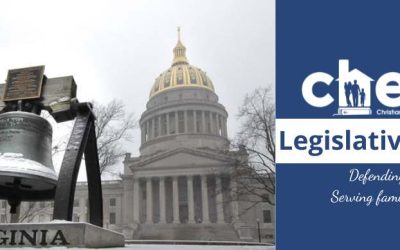While CHEWV has made only limited public statements about the happenings during the 2020 Legislative session, it is not due to lack of legislative activity related to homeschooling! On the contrary, this session has been somewhat of a roller coaster. At times, emails were drafted to call our members to action, and we were ready to push the send button. Why didn’t we? Because a well-prepared explanation from John Carey or data compiled by CHEWV would abate the concern – at least temporarily.
Our legislative liaison, John Carey, and many vigilant homeschoolers have been at the capitol from January through March to speak with legislators, address concerns, and monitor worrisome bills introduced in the 2020 legislative session.
So, what went well?
Communication.
- Early in the session, we learned about HB 4440 (Raylee’s Law). You can read about this bill HERE. While the intent of those who sponsored the bill was honorable, the wording of the bill itself was problematic – perhaps even unconstitutional. As the bill gained traction, CHEWV and HSLDA alerted WV homeschoolers to contact their legislators and explain the faulty reasoning included in the bill. Basically, homeschool law already provides the legal means for the county to deny homeschooling using due process. Thanks to the quick response of our homeschoolers, the bill remains in committee where it is dead for this session.
- CHEWV and John Carey then spent the remainder of the session communicating with legislators to counter opposition from other lobbyists.
Throughout 2019, various news articles had surfaced across the state hinting that counties were having issues with “homeschooling” related to truancy. CHEWV proceeded to meet with former State Superintendent Steven Paine about this issue and others; a report of the meeting can be found HERE. In the meeting, John Carey and CHEWV Board members addressed Paine’s concerns while raising some concerns of their own, including the lack of credible and consistent reporting from county school systems regarding homeschool enrollment.
Nevertheless, news articles continued to surface, and county and state officials began sharing concerns with legislators. Officials continued to point to homeschooling as an “escape” from truancy issues, despite the fact that the homeschool law and truancy law provide legal means for the counties to address this issue. During the 2020 Legislative Session, CHEWV and Mr. Carey worked countless hours answering questions, researching statistics, providing factual examples, and communicating information to legislators. Several times it appeared that more regulation would emerge as the only answer to legislators’ concerns, but then hearts and minds would be changed!
What to do going forward…
1. Be vigilant. With homeschooling becoming more and more a popular educational option, resistance is bound to occur. Public schools see homeschoolers as a loss of revenue. Some legislators continue to cite that one proverbial family who has been riding ATVs during the day for years now. The public’s impression of homeschooling varies depending on the homeschooling family they know or their perception of what homeschooling should look like. The harsh truth is that homeschoolers and homeschooling are being scrutinized in WV on all fronts. Many people still do not understand how a non-professional could provide a good education to their own children, how education can take place in the evening as well as during the day, how a ten-year-old would not know what “grade” they are in, how a second grader may not be reading yet, and a myriad of other practices found amongst homeschoolers. And those who don’t really understand the nuances of homeschooling often feel that it requires additional oversight.
So, how can each one of us help?
- Be accountable. Make sure that your child is getting the quality education a caring parent would want their child to receive.
- Be ready to give informative answers about the tailored facets of home education.
2. Be Positive. Homeschooling provides a wealth of amazing opportunities that go far beyond school books and online classes. Educating at home enables families to tailor each and every subject to fit each and every student’s needs. Students can pause, practice, explore, research and read about a topic, as opposed to just completing an assignment and checking off a box. Through this unique learning environment, conversations occur which build family relationships. Instead of peer pressure that tears down, home education offers opportunities to build confidence and overall well-being, while happiness occurs naturally as concepts are explored and then mastered. As you take advantage of these opportunities, ask yourself if you are being a positive example in word and deed. Yes, homeschooling is work, but by grabbing onto all of the positive aspects of the process, your family becomes a positive influence.
While we live in a state not yet deemed as homeschool-friendly as other states, we have made progress throughout 34 years of working together. In the early decades, it was extremely hard to make any improvements. But in the last 10 years we have been blessed by positive progress. Even when regulation was higher, homeschoolers were still met with the same arguments we hear today. There is always “that” family who is not meeting someone’s expectations. Be vigilant. Be positive. Defending our freedoms together, we can counter the naysayers and help change hearts and minds!



Recent Comments